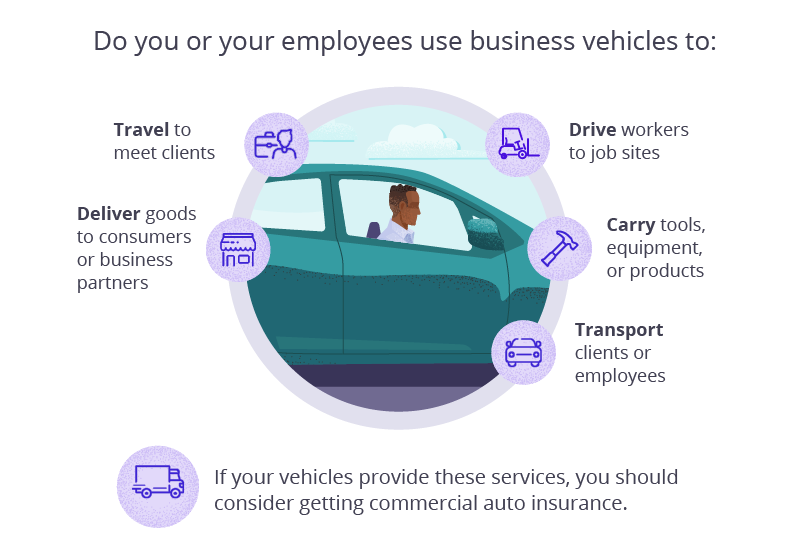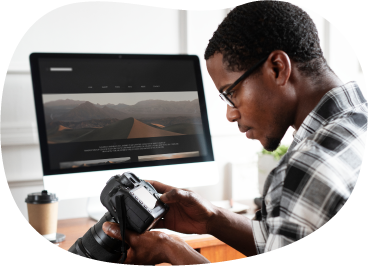

Commercial auto insurance for photographers and videographers
Commercial auto insurance covers legal bills, medical expenses, and property damage if a photographer or videographer's business vehicle is involved in an accident.
Commercial auto insurance covers the vehicles you depend on
Your employees may be skilled drivers, but accidents can happen to anyone. A collision could lead to another motorist getting injured, or a photography business's van being totaled.
An auto accident could cost your small business thousands of dollars, especially if someone is hurt. Compare that to the average premium of $147 per month for small businesses, and it’s easy to see why commercial auto insurance is the better deal.
How does commercial auto insurance protect your business?
Commercial auto insurance helps pay for lawsuits, property damage, and medical costs that arise from an accident involving a company vehicle. It can also cover vehicle theft, vandalism, and damage from hail and storms.
This policy can be tailored to fit the needs of a photo or video company. For example, a photographer who drives infrequently to client photo shoots may need less coverage than a video production company that drives long distances to different filming locations.

Who needs commercial auto insurance?
Company-owned vehicles must be covered by commercial auto insurance. It's the law in almost every state.
Commercial auto insurance may be required if you:
- Own a film production van or other work vehicle
- Transport film and photography equipment
- Send photographers or other employees to clients' homes
State regulations determine how much coverage you need. Your commercial auto insurance must meet your state’s liability insurance requirements.
Find commercial auto insurance requirements in your state

What coverage can commercial auto provide for photographers and videographers?
You can tailor your commercial auto insurance policy to match your business's risks and its budget. This policy can cover:
Legal expenses
If your photography or videography company is sued over an auto accident, legal expenses can pile up fast. You may also have to pay a settlement or court-ordered judgment.
Medical expenses
If an accident injures the driver of your photography business's vehicle, or any passengers, your policy can cover their medical bills.
Collision
Collision coverage pays for damage to a company car or other work vehicle, regardless of who caused the accident.
Uninsured motorists
Uninsured and underinsured motorist coverage pays for damage caused by drivers who lack insurance. Some states require this coverage.
Non-collision damages
Comprehensive insurance covers non-collision damages, including fire, vehicle theft, and vandalism.

Personal vehicles may need additional coverage
Commercial auto insurance only covers vehicles that are owned by a business, but sometimes employees drive personal or rented vehicles for work errands.
For example, a videographer might drive their own car to a wedding, or a drone photographer might rent a van to transport their equipment. Personal auto insurance also won't provide coverage if you get into an accident while driving for work.
Hired and non-owned auto (HNOA) insurance provides liability coverage for photographers and videographers who get into an accident while driving a personal, leased, or rented vehicle to conduct company business.
How much does commercial auto insurance for photo and video businesses cost?

Small business owners pay an average of $147 per month for commercial auto insurance coverage, but you could pay more or less depending on your risks.
Insurance costs for photo and video professionals are based on a few factors, including:
- Photography / videography services offered
- Value of camera, editing, and lighting equipment, etc.
- Annual business revenue
- Where your business operates
- Number of employees
- Your deductibles, claims history, exclusions, and coverage limits
Other important photography business insurance policies to consider
Commercial auto insurance covers the risks of driving for work, but it doesn’t cover everything. For peace of mind, photographers and videographers should also consider the following types of insurance:
- General liability insurance: This liability policy protects against basic risks involving customers, clients, and other third parties. It can cover accidental damage to a client's property or a slip-and-fall injury at your photo studio that leads to a lawsuit.
- Business owner’s policy (BOP): A BOP bundles general liability coverage with commercial property insurance at a lower rate than purchasing both policies separately. If a client is injured at your office or a thief steals your camera equipment, this policy would cover the costs.
- Professional liability insurance: This coverage can pay for lawsuits related to your work performance. For example, if a videographer hired to shoot a wedding misplaces the memory card, it can pay for legal expenses. This policy is sometimes referred to as errors and omissions insurance (E&O).
- Workers’ compensation insurance: This policy can pay for medical expenses if an employee suffers a bodily injury on the job. For example, if a photographer falls off a ladder while trying for the perfect angle, workers’ comp would cover their hospital bill. Most states require this coverage for businesses with employees.
- Equipment insurance: A standard commercial property policy only covers business property at a fixed location, which is why photo and video professionals usually need additional coverage. Equipment insurance, also called inland marine insurance, covers your cameras and other business property wherever you go.
Get free quotes and buy online with Insureon
Are you ready to protect your photo or video business with commercial auto insurance? Complete Insureon’s easy online application today to get quotes from top U.S. insurance companies.
You can speak with a licensed insurance agent to find the right types of coverage for your business. Once you find the best policy, your coverage can begin and you'll receive a certificate of insurance in less than 24 hours.
What our customers are saying

Want free expert advice right in your inbox?
By entering your email address and subscribing, you agree to our Terms of Use and Privacy Policy




